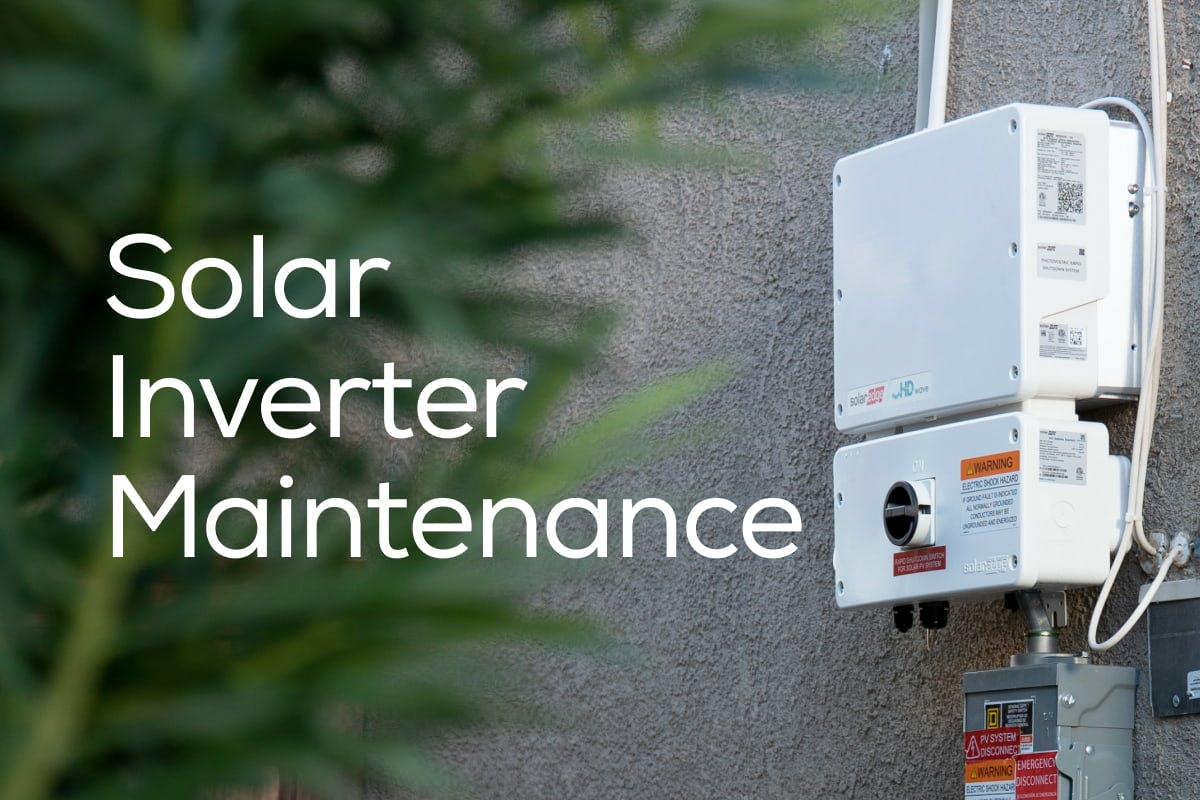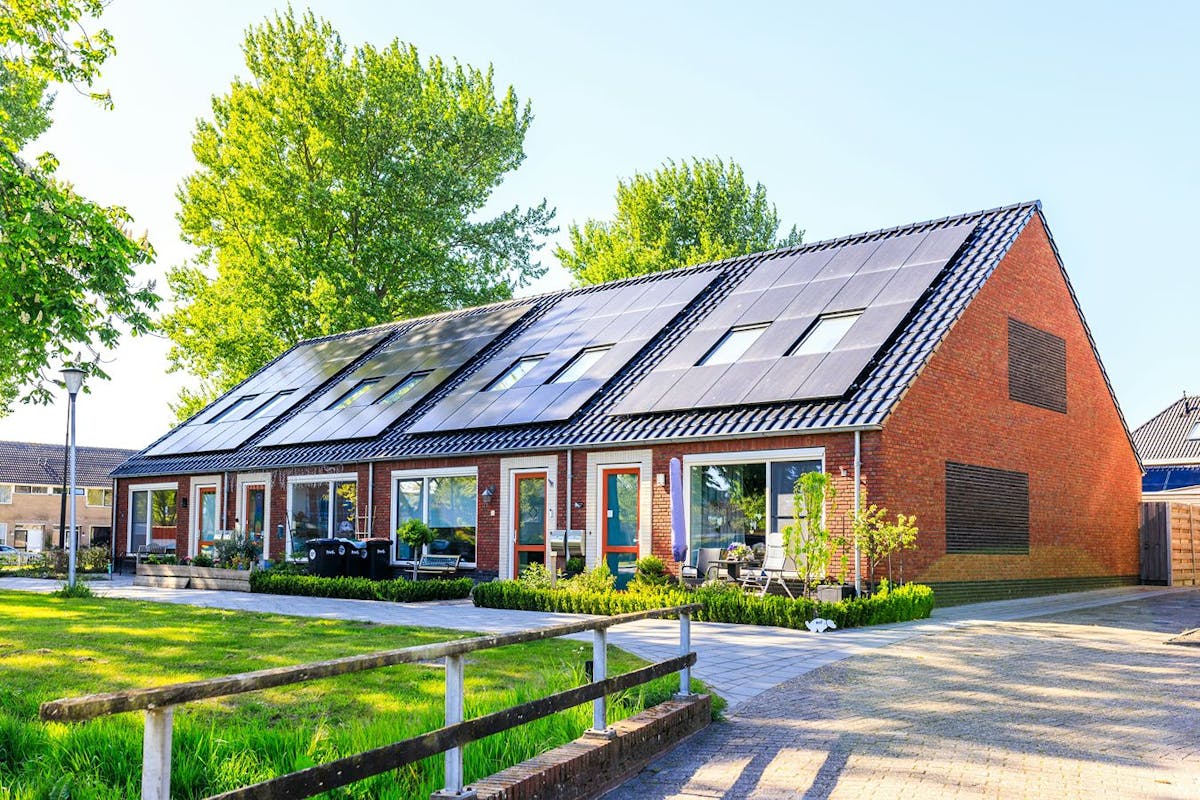Solar Inverter Maintenance, Repair, and Service Guide
Last edited
Author
Andrew Giermak
Solar and Electrification Writer and Editor
Editor
Andrew Blok
Electrification and Solar Writer and Editor

A home solar power system is more than just the solar panels on a roof. It needs multiple components, including a solar inverter, to make solar electricity usable for most home applications.
A solar inverter takes the direct current (DC) electricity from the panels and inverts it into alternating current (AC) electricity most appliances, electronics, and lighting in our homes use. Knowing the basics about solar inverters helps you keep your home solar power system in good working order.
See how much you can save by going solar with Palmetto
What Can Go Wrong With a Solar Inverter?
While home solar panels are designed to last for 25 years or longer, some solar inverters have a shorter expected lifespan. Even the best string inverters have a warranty that lasts for 10 to 12 years, so you will probably have to replace the inverter once or twice during the life of your solar power system. Microinverters, on the other hand, can last for the life of your system.
These signs could mean your inverter isn't working properly.
- Unusually high power bill: If your inverter isn’t creating enough energy for your home, you’re pulling more electricity from the grid, which will cause a higher utility bill.
- Error message: Contact your solar company to determine what is wrong and how to fix it.
- No lights on: If there are no status lights on, or the light is yellow, red, or flashing, that usually means there’s a problem with your inverter. Contact your installation company.
- Solar battery doesn’t charge: Some solar batteries are charged by power from the inverter, so if your battery isn’t charging, that can be a sign your inverter isn’t working.
- Connection appears damaged: If your inverter seems to have a damaged connection, the inverter may need to be repaired.
There are a handful of common issues that may cause your inverter to stop working.
Overheating solar inverter
Your inverter typically gets warm during use, but it can get too hot. If overheating occurs, the inverter gets less efficient or stops working altogether.
Typically solar technicians will conduct assessments on your inverter during installation to ensure the cooling technology works properly. This includes checking the building housing the inverter and the switch cabinet are properly ventilated.
Once installed, you can periodically check the cooling system and ventilation. You can also reduce the potential for overheating by cleaning dust filters and removing obstructions that could impede airflow.
Faulty solar inverter installation
There is a possibility your solar technician did not install the inverter correctly, either with a physical connection or a programming component.
When the installer finishes setting up the inverter, they should carry out several tests like a yield test, remote activation, remote deactivation, and regulation of the reactive power. Any issues with the connection should be evident at the time of testing and addressed immediately.
Inverter isolation fault
Another possible inverter issue is the isolation fault, a short circuit between different parts of the circuit that produces an "isolation alert.” If this error occurs, the inverter will either work at a reduced level or shut down completely.
A combination of factors can cause this alarm, including damage to the cabling sleeve, moisture, incorrect installation, and a bad connection of DC cables to the panel. It is more common to see this problem in places with higher humidity and in systems near the bodies of salt water.
Maximum power point tracking issues
Many inverters use maximum power point tracking (MPPT), a technique that maximizes the inverter's performance. MPPT occurs when photovoltaic (PV) modules in a solar array are connected in a series called "strings" that are connected to the inverter.
Each string produces different amounts of power based on shading, positioning, faults in panels, and more. These conditions mean the strings can send different voltages to the inverter at the same time.
The MPPT module ensures your system generates the most electricity. However, this MPPT system can have issues only a technician can repair.
Power optimizer issue
Many solar systems use power optimizers, a type of module-level power electronics that maximizes the system's energy production. An optimizer is a small electronic device attached directly to the back of each individual solar panel.
Each panel in an array produces a slightly different amount of power due to factors like minor shading, soiling, or manufacturing tolerance. In a traditional string system, the lowest-performing panel can reduce the output of all other panels in its string.
The power optimizer solves this by adjusting the voltage before sending power to the inverter. This isolates underperforming panels, ensuring they don't drag down the performance of others. However, because every panel has its own electronic device, this adds dozens of potential points of failure on the roof. A faulty optimizer can cause its associated panel to stop producing power and will require a technician to diagnose and replace.
Solar power inverter restarting issues
If something happens to the grid that causes your solar power system to malfunction, an inverter can typically restart itself. If that doesn’t happen, a service technician may need to come out to manually restart the system. Until they can come out, your panels won’t produce any electricity.
To avoid this issue, you’ll want to buy a system with high-quality components and a 24/7 monitoring system. This way, as soon as there is an issue, someone can immediately get called out to fix it.
See how much you can save by going solar with Palmetto
Maintenance Tips for Your Solar Inverter
Solar power systems are designed to be reliable and not require a lot of maintenance, but there are still a few steps you can take to ensure peak performance from your equipment. Here are a few solar inverter maintenance tips you can do to keep your inverter working as it should.
Keep the inverter cool
As your inverter changes electricity from DC to AC, it naturally gets hot. To ensure the inverter gets proper airflow, it's recommended you keep at least a foot of open space around your equipment.
If your inverter has a fan, make sure nothing blocks or jams it. If your fan stops working, the inverter could overheat and lose efficiency.
Lastly, make sure nothing flammable is near your inverter, as that object could catch on fire if the equipment gets too hot.
Keep the air intake filter clean
Depending on an inverter’s location, the air intake filter can get dirty. If the filter accumulates too much dust and debris, it won't be able to cool as well, which affects the inverter's efficiency.
If the filter is dirty, we recommend you call a professional to clean the filter, as it may require taking apart some of the equipment.
Check for error codes
While you don't need to check your inverter daily, you should check it periodically. This includes looking on the inverter screen for any error codes, or a different light than a green LED. If anything seems amiss, call a professional to assess it.
Use solar monitoring technology
If the solar company provides you monitoring technology, like in the Palmetto app, it can provide regular updates about the status of your solar panels and inverter, and give you prompt access to customer service and technicians if needed.
What Should I Do if My Solar Inverter Stops Working?
Unfortunately, no matter how well you maintain an inverter, it can still have issues that cause a decrease in performance. If your inverter stops working, you have several options to fix the problem.
Contact your solar installation company
A good first step is to talk with the company that installed your solar panel system. They may be able to send a technician to assess what is happening with your inverter. They should have the technical knowledge to fix the inverter or replace it.
Contact the inverter company
If the solar company that installed your inverter has gone out of business, your next step is to contact the inverter manufacturer. That company may be able to send a technician. They may also ask a local solar company to send someone out to get your inverter repaired or replaced.
Contact another solar company
Another option is to reach out to an established and trusted solar company. You may be asked to provide paperwork, data, or information to help the process of determining the issue.
Can I Repair My Solar Inverter Myself?
No. You should never try to fix an inverter yourself. It is a complicated piece of electrical technology that requires a lot of technical knowledge. You could make the problem worse or hurt yourself.
Attempting to fix the inverter on your own could void your maintenance and service agreement. In addition, you could face repercussions from your utility company and other government entities because you aren’t a licensed solar technician.
Ultimately, if you notice something seems off with your inverter, it is best to call a professional. They should be able to determine the problem, and fix or replace the inverter as needed.
Your solar installer may offer a monitoring solution. Palmetto offers the Palmetto app for system tracking, production reports, energy recommendations, customer service, ways to save money, and maintenance scheduling.
Expert Help With Solar Inverters and Home Energy
Solar panel care and solar inverter care are connected. Without a functioning inverter, the DC electricity created by your solar panels can’t become the AC electricity your home needs. That’s why solar inverter maintenance, solar inverter service, and solar inverter repair can be so important.
From questions about inverters and everything about solar power and home energy needs, talk with Palmetto today. Learn about the Palmetto Protect monitoring service, estimate your solar savings, or explore Palmetto’s Savings Maximizer.
See what solar can do for you:
Frequently Asked Questions
Is there routine care I can do with a solar inverter?
Yes, it’s a good idea to regularly check inverters in your system. You can look for debris on the inverter which could cause overheating or a fire hazard. It’s smart to regularly check any LED lights or error screen, as well as a system monitoring app if you have one, for errors or messages.
What if I need to replace a solar inverter before my panels?
It’s pretty normal and expected to need to replace a solar inverter during the life of solar panels and a whole system. The lifespan of a solar inverter can be 10-20 years while solar panels last 25 years or longer. Replacing a solar inverter needs to be done by a qualified solar technician or electrician.
Can working on an inverter be dangerous?
Yes, an inverter has high-voltage electrical currents running through it. As with any electrical equipment, doing DIY work on it is not recommended. Working on an inverter can be a shock and fire hazard without professional knowledge and work equipment.


